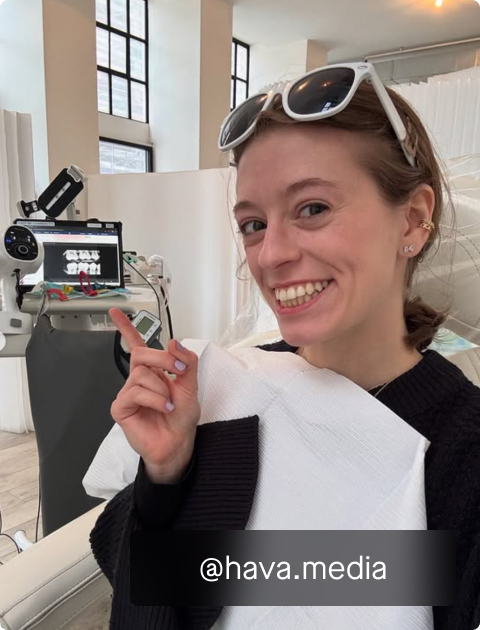Do your teeth suddenly feel sensitive? It might not be your fault.

Maybe you enjoy a steamy cup of aromatic coffee in the morning. Or like to reward a hard day's work with some ice cream. But tooth sensitivity can turn those little pleasures into extremely painful experiences. Foods, drinks, and even air can send searing pain through your mouth if you have tooth sensitivity. But it isn't something you have to live with forever.
Why do my teeth feel sensitive?
You've been going about your life, brushing, flossing, avoiding jawbreakers. Then one day you experience sensitivity in your mouth to hot, cold, sweet, and/or sour drinks and food. Basically all the good beverages and noshes are now your foe. What gives?
Well, your teeth are encased by enamel. Below that is "dentin," a layer that sits right below your enamel and gums. This dentin layer has tiny openings called channels, and inside each channel is a nerve that connects to your tooth's nerve. These smaller nerves allow you to sense something is touching your teeth and help you control how hard you're biting. When your dentin loses its protective covering, those nerves get too much stimulation, which can hurt like heck.
There are two ways dentin channels become exposed:
- Enamel loss. When your enamel wears out, cracks, or breaks, it creates a direct line to the dentin. Cavities are a direct hole to your dentin, which is what causes that awful pain when you get a cavity. Enamel can erode because of acid, attrition (wear from things like grinding), and abrasion (wear from things like aggressive brushing).
- Gum recession. Your gums are super important for protecting your teeth. 80% of tooth sensitivity starts at the gum line. When the gum line recedes too far, it exposes the dentin near the gum line.
If you don't practice good oral hygiene at home, your chance of having sensitive teeth increases. Bacteria that come from lingering food particles are a big culprit in wearing out your enamel and affecting your gums.
But I take care of my teeth, how did I still end up with sensitive teeth?
We talk to patients all the time who are diligent about their at-home dental care, but still end up with sensitive teeth. And we tell them all the same thing: It's not your fault. For decades, we've been given the generic advice at the dentist: brush, floss, fluoride. But this guidance doesn't take into account that every mouth is unique and requires a personalized approach to at-home care. Brushing, flossing, and using fluoride are a good baseline, but your mouth requires tailored love and care to keep it in top shape. That's why 40% of Americans suffer from tooth sensitivity.
Now that I have sensitive teeth, do I have to eat room temperature plain oatmeal for all eternity?
If you have tooth sensitivity, it's a good time to pause and pay attention. Sensitivity means something is wrong with the tooth and getting on its nerves. Literally.
The good news is you aren't destined to a life of bland foods. You can make changes to your at-home routine to address your tooth sensitivity. If you address tooth sensitivity early, there are many methods to manage the underlying causes.
To manage sensitivity, it's important to understand your mouth's unique needs. A dental professional can help you learn more about the type of mouth you have, and recommend a combination of at-home products, tools, and guidance to achieve amazing oral health. For example, adding a fluoride rinse or gel into your daily routine can help make your teeth less sensitive.
Following the right at-home guidance and continuing to fine-tune your at-home care can help you reduce and even prevent issues, like tooth sensitivity. And even if you can't make it work at home, your dentist will have options to help you in-office to help you get back to eating those delicious foods.









